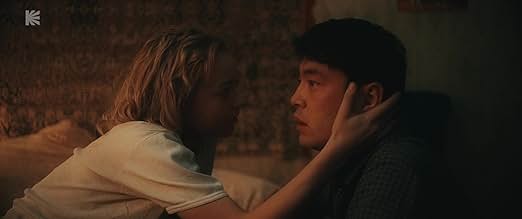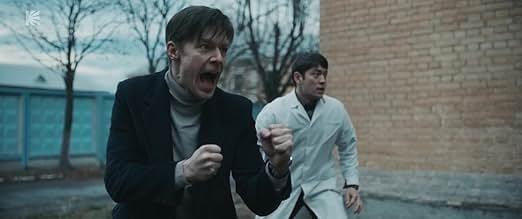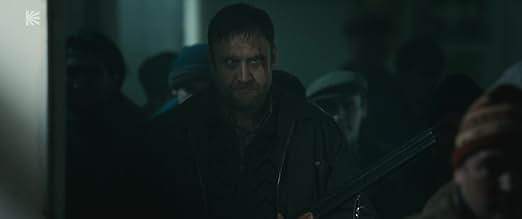Aggiungi una trama nella tua linguaThe Elista Children's Hospital faces the USSR's first major HIV outbreak in the 1980s, with over 70 children and adults infected. Doctors, patients, and families strive to uphold dignity ami... Leggi tuttoThe Elista Children's Hospital faces the USSR's first major HIV outbreak in the 1980s, with over 70 children and adults infected. Doctors, patients, and families strive to uphold dignity amidst an incurable disease.The Elista Children's Hospital faces the USSR's first major HIV outbreak in the 1980s, with over 70 children and adults infected. Doctors, patients, and families strive to uphold dignity amidst an incurable disease.
- Premi
- 1 vittoria in totale
Sfoglia gli episodi
Trama
Lo sapevi?
- ConnessioniReferenced in kuji: Gavr and Malovichko: One-on-One with Story (2024)
Recensione in evidenza
"Patient Zero" interested me as soon as I found out about it. The series was well advertised on the Internet, but it was the topic I wanted to reveal that attracted my attention. This topic is very important, although it is constantly hushed up in those days, now. Let's just say that today much less attention is paid to it than it should be, the focus is shifting to other challenges in the form of, for example, the coronavirus pandemic. Although the problem of HIV, about which the story will be told in the series, in my opinion, is no less important.
The series is based on real events that took place in 1988 at the Children's Hospital of Elista. It was there that the outbreak of HIV infection occurred. The viewer can observe what is happening through the prism of perception of the emerging situation by several participants of the events at once. And the further these events unfold, the more you realize that those scant knowledge about the disease, the careless attitude in society towards your health and the professional mistakes of doctors led to what eventually happened.
Of course, then there was much less knowledge about the course of the disease, its transmission, there was no education, and the authorities habitually rejected any problems in the country, preferring to keep silent about such an important event in order to try to show that there are no Western problems in the Soviet Union. Besides, responsible people tried to save their careers, I don't even think about human lives, including children's. This is a problem of the authorities, it has long been known about it. But here, in my opinion, there is a certain problem of the series, as well as many projects that exploit the theme of the USSR, necessarily demonstrating how untenable this project was.
The Soviet government can be treated in different ways. The time was contradictory. However, even decades after the USSR collapsed and the ideology went into oblivion, there are still problems on the agenda, which, according to various sources, stretch from that era. Often people's opinions about those times are inspired by such projects like "Patient Zero". People don't even realize that they consider the problems of the USSR as such thanks to such propaganda, which works perfectly, becoming a formative force from project to project, where there is a clear line on the type of mandatory KGB officers with stone faces, denial of problems by high-ranking officials and silence of emergency situations by officials. And it turns out that the viewer sees the inconsistency of the ideology itself, and not the specific problem of people who decide the fate of others.
But back to the series. "Patient zero" is well placed. With all the problems described above, the project deserves attention and looks really interesting. A lot of important characters are perfectly worked out in the script and adequately played by actors. Different storylines alternate well, allowing you to eventually put together the big picture from the puzzles, see how the epidemic was progressing, what was being done to find patient zero, how the city lived in that difficult time.
The series does not build its entire mythology on the negative image of the system itself. This is a pleasant discovery for me personally. The creators honestly tried to show what people's fears can be: for themselves and their careers, for the health of loved ones and the possible attitude of society towards him. The project is designed to remind you that there are no outright villains and great heroes. Life is a rather complicated thing, there is a lot of gray in it, not black and white. In one situation or another, sometimes difficult and contradictory decisions have to be made. But each such decision has its own reasons and consequences. Despite the clearly traceable line of the "Scoop" and its sinfulness in all matters, the creators of the series carefully and respectfully introduce a different idea - we are all people with our pains and fears, aggression and empathy. But still we are people.
I would like to mention the main characters. For example, I liked Pavel Maikov. His character Pyotr Shipov balances between the usual heavy and uncooperative intelligence officer and a person who really wants to get to the root of the problem and solve the problem, and not just find the culprit or even worse appoint one. Nikita Efremov showed his hero Goncharov as a dedicated person, but in the final, contrary to my expectations, he still accepted the complexity of society and the system in which it lives and made the choice that he made. The works of Askar Ilyasov, Evgeny Stychkin, Elizabeth Shakira, Evgenia Mandzhieva, Ivan Dobronravov and others are good. All of them successfully fit into their roles, creating a general atmosphere of the picture.
"Patient Zero" raises one of the most important topics of its time and modernity. HIV is among us, it has not gone anywhere. It is important to know and study this problem. State participation is also important. There is no need to brush it off and turn away, believing that this trouble can happen to anyone, just not to you. This is a common problem, not just drug addicts, people with promiscuous sexual relations and the like, as people used to think. If we study this issue, we can understand that today, with modern medicines and with proper and timely diagnosis, HIV does not become fatal. You can live with it for many decades, having lived as long as people live without the disease. The main thing is to start treatment in the early stages in time, not to start your health, to know the basic things about this disease. And knowing this, people will not shy away from HIV-positive people as from lepers, because there will be an understanding that these are the same people as everyone else, they cannot infect through a handshake or shared dishes. And together, one day, I want to believe, humanity will be able to defeat this disease once and for all.
9 out of 10.
The series is based on real events that took place in 1988 at the Children's Hospital of Elista. It was there that the outbreak of HIV infection occurred. The viewer can observe what is happening through the prism of perception of the emerging situation by several participants of the events at once. And the further these events unfold, the more you realize that those scant knowledge about the disease, the careless attitude in society towards your health and the professional mistakes of doctors led to what eventually happened.
Of course, then there was much less knowledge about the course of the disease, its transmission, there was no education, and the authorities habitually rejected any problems in the country, preferring to keep silent about such an important event in order to try to show that there are no Western problems in the Soviet Union. Besides, responsible people tried to save their careers, I don't even think about human lives, including children's. This is a problem of the authorities, it has long been known about it. But here, in my opinion, there is a certain problem of the series, as well as many projects that exploit the theme of the USSR, necessarily demonstrating how untenable this project was.
The Soviet government can be treated in different ways. The time was contradictory. However, even decades after the USSR collapsed and the ideology went into oblivion, there are still problems on the agenda, which, according to various sources, stretch from that era. Often people's opinions about those times are inspired by such projects like "Patient Zero". People don't even realize that they consider the problems of the USSR as such thanks to such propaganda, which works perfectly, becoming a formative force from project to project, where there is a clear line on the type of mandatory KGB officers with stone faces, denial of problems by high-ranking officials and silence of emergency situations by officials. And it turns out that the viewer sees the inconsistency of the ideology itself, and not the specific problem of people who decide the fate of others.
But back to the series. "Patient zero" is well placed. With all the problems described above, the project deserves attention and looks really interesting. A lot of important characters are perfectly worked out in the script and adequately played by actors. Different storylines alternate well, allowing you to eventually put together the big picture from the puzzles, see how the epidemic was progressing, what was being done to find patient zero, how the city lived in that difficult time.
The series does not build its entire mythology on the negative image of the system itself. This is a pleasant discovery for me personally. The creators honestly tried to show what people's fears can be: for themselves and their careers, for the health of loved ones and the possible attitude of society towards him. The project is designed to remind you that there are no outright villains and great heroes. Life is a rather complicated thing, there is a lot of gray in it, not black and white. In one situation or another, sometimes difficult and contradictory decisions have to be made. But each such decision has its own reasons and consequences. Despite the clearly traceable line of the "Scoop" and its sinfulness in all matters, the creators of the series carefully and respectfully introduce a different idea - we are all people with our pains and fears, aggression and empathy. But still we are people.
I would like to mention the main characters. For example, I liked Pavel Maikov. His character Pyotr Shipov balances between the usual heavy and uncooperative intelligence officer and a person who really wants to get to the root of the problem and solve the problem, and not just find the culprit or even worse appoint one. Nikita Efremov showed his hero Goncharov as a dedicated person, but in the final, contrary to my expectations, he still accepted the complexity of society and the system in which it lives and made the choice that he made. The works of Askar Ilyasov, Evgeny Stychkin, Elizabeth Shakira, Evgenia Mandzhieva, Ivan Dobronravov and others are good. All of them successfully fit into their roles, creating a general atmosphere of the picture.
"Patient Zero" raises one of the most important topics of its time and modernity. HIV is among us, it has not gone anywhere. It is important to know and study this problem. State participation is also important. There is no need to brush it off and turn away, believing that this trouble can happen to anyone, just not to you. This is a common problem, not just drug addicts, people with promiscuous sexual relations and the like, as people used to think. If we study this issue, we can understand that today, with modern medicines and with proper and timely diagnosis, HIV does not become fatal. You can live with it for many decades, having lived as long as people live without the disease. The main thing is to start treatment in the early stages in time, not to start your health, to know the basic things about this disease. And knowing this, people will not shy away from HIV-positive people as from lepers, because there will be an understanding that these are the same people as everyone else, they cannot infect through a handshake or shared dishes. And together, one day, I want to believe, humanity will be able to defeat this disease once and for all.
9 out of 10.
- alekspredator87
- 8 ago 2022
- Permalink
I più visti
Accedi per valutare e creare un elenco di titoli salvati per ottenere consigli personalizzati
- How many seasons does Patient Zero have?Powered by Alexa
Dettagli
- Data di uscita
- Paese di origine
- Lingua
- Celebre anche come
- Patient Zero
- Azienda produttrice
- Vedi altri crediti dell’azienda su IMDbPro
- Tempo di esecuzione50 minuti
- Colore
Contribuisci a questa pagina
Suggerisci una modifica o aggiungi i contenuti mancanti

Divario superiore
By what name was Nulevoy patsient (2022) officially released in Canada in English?
Rispondi



























